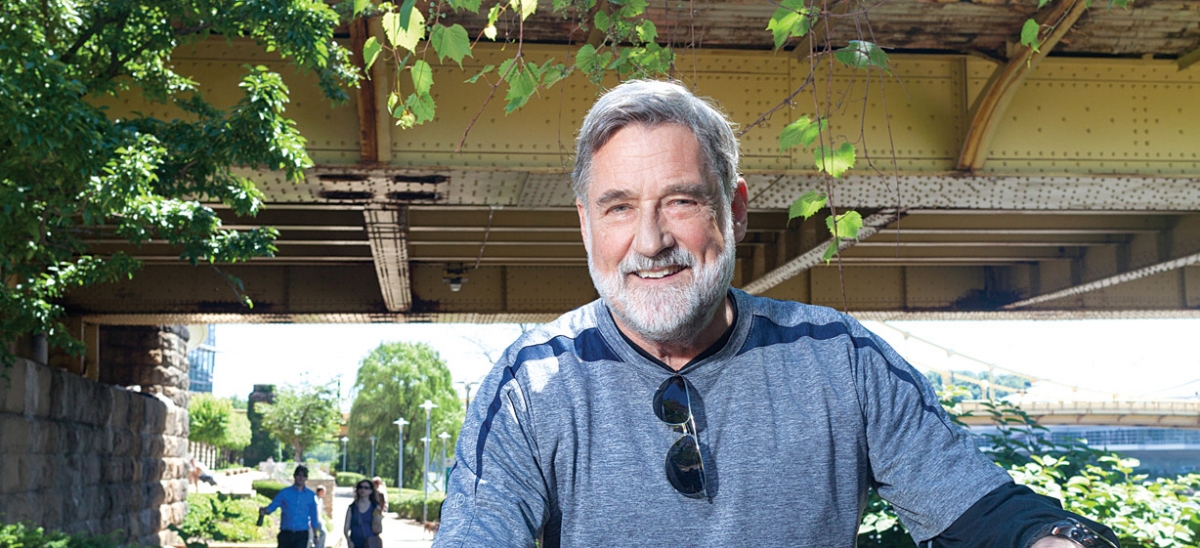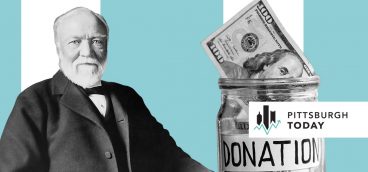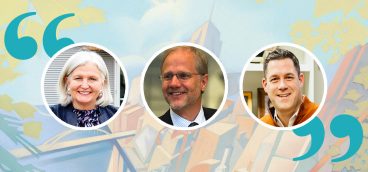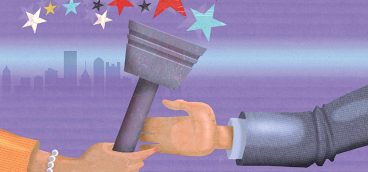Maxwell King, Philanthropy Executive

I am Maxwell Evarts Perkins King, named after Maxwell Evarts Perkins, my grandfather, who was the editor at Scribner’s for Thomas Wolfe, Ernest Hemingway and F. Scott Fitzgerald, among other authors. Even though my mother always told me, “Go to law school, Max” (many of her family members were lawyers), all she ever talked about was literature. So, of course, the signal I got was not to go to law school, but to pursue what both my mother and I really cared about, which was books and writing.
When my wife, Peggy, and I moved to Pittsburgh in 1999 and I assumed the president’s position at The Heinz Endowments, my aunt, who was my grandfather’s oldest daughter, gave me a copy of Marcia Davenport’s “The Valley of Decision,” and explained that her father had been the editor of that book, which was all about Pittsburgh. She told me that he had gone, many times, to Philadelphia to meet with authors and associates, but didn’t like it there. He thought it was stuffy, pretentious and self-imporant. Now, Marcia Davenport lived in Pittsburgh, and once asked him to please come out and talk with her. “I’m writing this novel about Pittsburgh,” she told him. “It’s a fantastic story about the history here, but I need you to help me because I’m stuck.” My grandfather declined her request for him to travel saying, “I don’t want to go to Pennsylvania. I’ve been there and don’t like it.” Then she implored him. “Please, you must come.” So as the dutiful man of letters he was, my grandfather took a train across Pennsylvania to Pittsburgh and found that he loved the place. To him, my aunt explained, Pittsburgh was “authentic and real.” In essence, I believe that my grandfather identified a distinct cultural marker of the city and region. Pittsburghers really know who they are, and care about people.
Actually, I was born and raised not far from Pittsburgh, in eastern Ohio, in a place called Alliance, which was a small steel town. My father worked in one of its three little mills when he was a young man. But like Pittsburgh, over time, Alliance lost its steel industry, and its economy got very rocky, so I wanted to get out of there, and did. My mother’s family was mainly from New England, so I went to high school and then college there. I enrolled at Harvard as a government major, but didn’t know what I wanted to do. So instead of figuring that out, I quit school and thought, “I’ll travel.” I wanted to join the Merchant Marines, but it was a struggle to get in. Finally, I went to a couple of union halls in Cleveland, banged on the doors, and talked to the guys there about my prospects. One took pity on me and said, “Here’s your problem, kid. You can’t get seaman’s papers without a job, and you can’t get a job without seaman’s papers. But,” he continued, “here’s what I’ll do for you. Do you see that cot back there? The only way you’re going to get a job is if you’re the only person here when one opens up. When I get a phone call saying that there’s a berth, if you’re the only person here, you’ll get it. Then I’ll get you your seaman’s papers in two hours and you’ll be on the water.” So I lived on that cot for days and, sure enough, at two o’clock one morning, that man woke me up and said that a ship needed a deckhand to unload ore on Lake Erie. So I went there and spent four hours in the hold, shoveling. But I got my seaman’s papers, and I had a berth. I traveled all around the world for about 18 months before I realized that I didn’t want to be a working man for the rest of my life. So I went back to college and majored in English literature, which was fun, but prepared me only for teaching or journalism. I hadn’t the patience to teach, so I got a job at a newspaper.
I first worked in Vermont for the Rutland Herald, which was a good paper, and then moved on to the Providence Journal-Bulletin, then to the Louisville Courier-Journal & Times in Kentucky, and finally to the Philadelphia Inquirer. But I left the Inquirer after about four years. I was around 29 years old, had risen to the position of city editor, but wanted to get back to writing. So I headed for New York and got a writing job at Forbes. That was fine for a while, but I really didn’t fit in the magazine world. I was a newspaper man. You see, Forbes was an advocate for business, and I was more comfortable with the newspaper model of not being an advocate for anyone or anything. So I went back to the Inquirer. When I finally became editor there, in 1990, I succeeded a man named Gene Roberts, who was truly one of the great newspaper editors of the 20th century. He’d built the Inquirer into the giant that it was. I wanted to stay true to what Gene had built and worked really hard to do so. But it was hard to succeed a legend like him. And then came the Internet and the beginning of the decline of the newspaper business. Running a paper was like managing in a straight jacket because every time you’d turn, things tightened up. The margins were declining. So were revenue and advertising. Circulation was also declining, although we did turn that around for a few years. Nevertheless, it was a wonderful and very exciting job. But I wouldn’t say it was fun.
“The thing about Pittsburgh is, when you come here, you must be willing to put your shoulder to the wheel and participate, to be a part of it and move things forward.”
– Maxwell King
One day, while I was toiling away in Philadelphia, I got a call from a headhunter who wanted to know if I would consider applying for the president’s job at The Heinz Endowments. Now, there was a guy at the Philadelphia Daily News, a columnist who I knew pretty well, named Russell Byers, from the Byers family in Pittsburgh. I called him up and said, “Russell, this headhunter from New York has approached me about going to Pittsburgh and running The Heinz Endowments, and I want to get your opinion.” He paused for about 30 seconds and then said, “Max, you don’t even know that you’re the luckiest person in the world, do you? But you are. You will love Pittsburgh. You’ll have more fun at The Heinz Endowments than you can believe.”
I knew very little about Pittsburgh at the time. I had only been here twice before, and the only thing I remembered was Smallman Street which, when I first visited many years ago, had not been paved. It was this long, wide and fabulous Belgian block avenue. I never forgot that. Anyway, before I interviewed for the job at the Endowments, I got a bunch of books and read about Pittsburgh’s history. What I quickly came to realize was that if you looked at the whole history of America going back to pre-Revolutionary times, Pittsburgh somehow was at the center of everything. In every era in American history, Pittsburgh played a central role, and kept changing, kept reinventing itself. It was, at one time, a center for boatbuilding for the rivers; and then came the Industrial Revolution and Big Steel; and then Pittsburgh’s role in two World Wars. And I happened to come here during another major transition, at the end of the 1990s, after the loss of steelmaking. Pittsburgh was reinventing itself again as a center for high-tech and healthcare. I got to play a role in that and loved it.
I don’t think I’ve ever enjoyed anything as much as my time at The Heinz Endowments. I had already run a newspaper with a $90 million budget and had 650 people reporting to me, so I thought, “I know how to run an organization, and that experience will help me at the Endowments.” But when I got there, the experience that was critical was not managerial; it was my reporting experience, because grantmaking requires the gathering of information, understanding an issue or a problem, organizing, analyzing, synthesizing, and then presenting a response in a way that gets people excited and convinces them to coalesce around it. It’s like writing a piece for “Sunday, Page One.” So my reporting background was what I drew upon and what made the job a comfortable fit. The big difference was, if you’re a newspaper man, you do all of that, and then keep a distance. You’re not an advocate; whereas if you’re running a foundation, you must embrace a cause and become an advocate for it. Three things made that transition easier for me: the staff at The Heinz Endowments—incredibly capable people who helped me to understand the community and all the ramifications of what we do; the board; and the Heinz family—Teresa and John, Andre, and Chris—all of whom are so committed to the Pittsburgh region. Their commitment inspired me and made it easier for me to engage the community and do my job.
Now, don’t get me wrong; I loved Philadelphia. I loved living and working there. But like my grandfather said, it felt a little “stuffy, pretentious and self-imporant.” If the people in Philly wanted to talk to you, they’d look you up in the Social Register first to see if you were listed. Pittsburgh’s the opposite. It’s very open, very direct. The thing about Pittsburgh is, when you come here, you must be willing to put your shoulder to the wheel and participate, to be a part of it and move things forward. If you are, the community accepts you right away. I don’t think that it’s Pittsburgh’s smaller size that allowed me better access to community life here than in Philadelphia. As the editor of the city newspaper there, I was an outsider and, sometimes, that role became adversarial with some members and groups within the community. When I came here, however, as the head of a foundation, I immediately fit into the community. Another factor was my stage of life at the time. I really wanted to be part of something, and I was. But after nine jam-packed, exciting years, I decided to step down. My logic in leaving Pittsburgh was impeccable. “I’ll retire and spend my time writing, which I can do anywhere. And I’ll move closer to my children and grandchildren.” Both of my sons live in New England, as do my four grandsons. So it was logical for me to head back there. But it was all wrong—for several reasons. First of all, I found retirement very boring. And it’s just so solitary. I missed being a part of the nonprofit community and part of Pittsburgh. And I missed city life much more than I had anticipated. I had spent much of my life in cities and suddenly I was in the country full time. Now, I love hiking and biking in the country, but that’s not the same as living there. And I particularly missed this city because it’s so exciting. There’s so much momentum here that, having been a part of it and then being away for a while, I really missed it. Somewhat to our surprise, Peggy and I realized that, during the years we lived and worked here, Pittsburgh had become our “hometown.” We were in Philadelphia for 27 years, but never became a part of the community there. So, that’s why we came back. And, so far, we’re thrilled about it.
Now I’m heading up The Pittsburgh Foundation. Like The Heinz Endowments, we have the responsibilty to ferret out good ideas and help them to be realized with financial support. We don’t do the work; we fund the work and, therefore, have the pleasure of listening to and learning from a lot of good and smart people. But the Endowments and The Pittsburgh Foundation are different in a number of ways. Principally, we have a more complicated mechanism than the Endowments, whose activities are about grantmaking, principally, and managing the investment portfolio properly so that it keeps growing. At The Pittsburgh Foundation, we have several supporting organizations, and are responsible for development, fundraising and serving our donors, some of whom have been contributing here for a long, long time. We also welcome new donors who come to help support work in which they’re particularly interested. Some are local while others have ties to the region, but don’t live here. Our grantmaking takes place mostly in Allegheny County. But the grantmaking of our donors takes place all over Pennsylvania and sometimes around the country. To me, what is so exciting about this organization is its culture. It involves the generosity of many people. We engage our donors and find synergistic areas that involve both our own program staff and our grant making.
Over time, we have learned that, in our region, barriers to opportunity exist for many and that fact is going to be an “organizing principle” for our grantmaking. We have a work plan for the next couple of years called “100 Percent Pittsburgh,” and for this effort to bear fruit, every person will have to care that the person next to them is benefiting from the “New Pittsburgh.” We will involve civic, business, nonprofit and philanthropic leaders in reaching out to those whose lives are the most diminished by poverty, and will add their voices to the mix. I don’t think my grandfather would be surprised at such an effort. Helping each other to discover new pathways to opportunity throughout the city and the region is just what any Pittsburgher would do.




